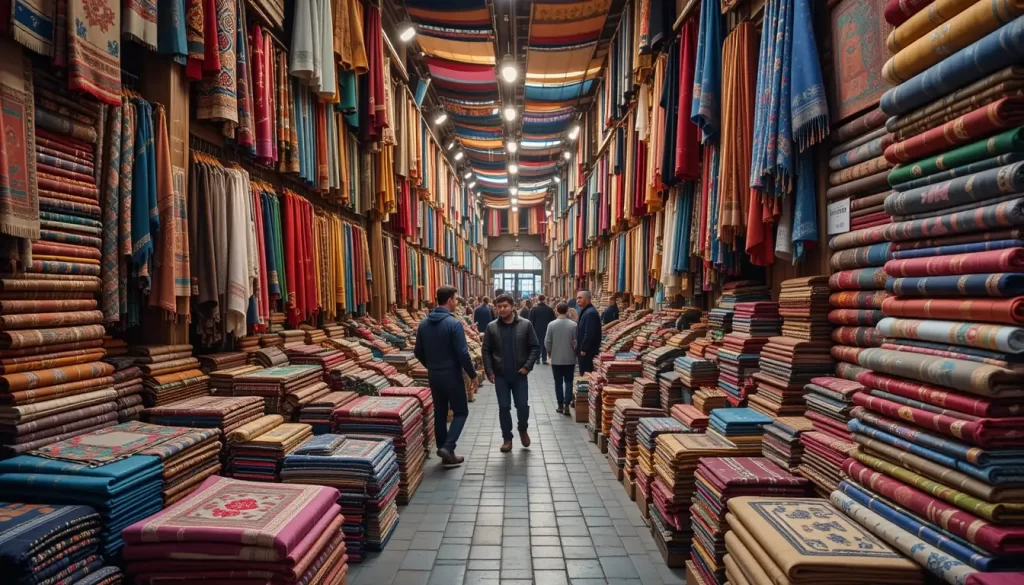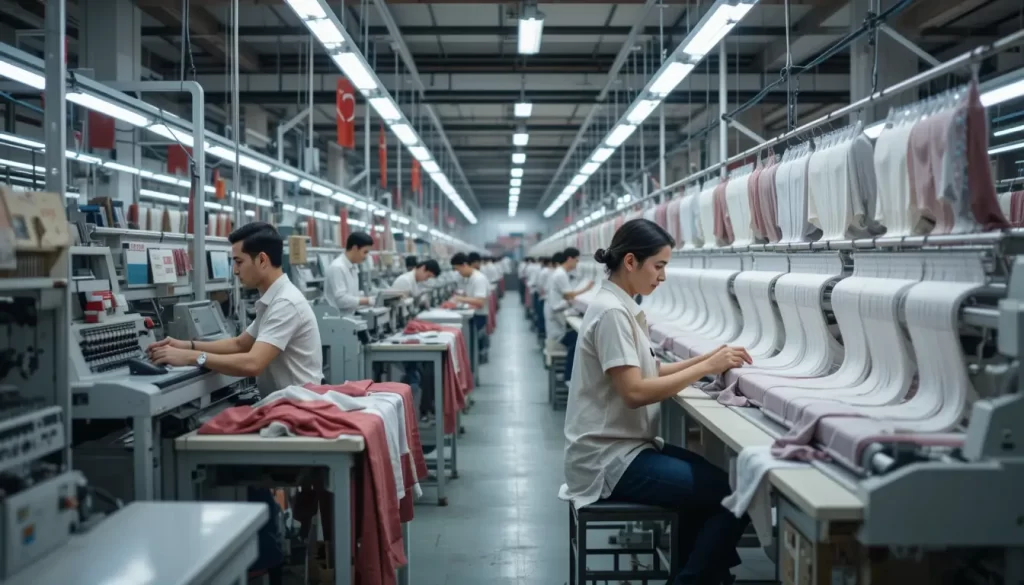Overview of the Turkey Textile Industry: A Global Powerhouse
The Turkey textile industry is a formidable pillar of the national economy, representing a blend of historical craftsmanship and cutting-edge innovation. As the seventh-largest textile exporter globally, Turkey has built an exceptional ecosystem of mills, dyeing facilities, and vertically integrated manufacturers. Spanning centuries of artisanal tradition, the country’s textile production has evolved into a tech-savvy, eco-conscious, and fashion-forward powerhouse.
Turkey’s geographic proximity to Europe, competitive labor market, and rapid adaptability to fashion trends position it as a preferred hub for premium denim, knitwear, woven garments, and technical textiles. In 2024, the sector reported over $13 billion in textile exports, with increasing emphasis on sustainable production and circular fashion.
The Roots of Turkish Textile Excellence
A Legacy Woven Through Time
Turkey’s textile heritage traces back to the Silk Road, where Ottoman weavers crafted elaborate silk brocades and cotton muslins. Traditional kilim weaving, hand embroidery, and natural dyeing techniques once dominated local markets. These artisanal skills have not disappeared—they have been seamlessly integrated into modern factories that celebrate both speed and quality.
From Handlooms to High-Tech Facilities
Cities like Bursa have transitioned from silk weaving to producing high-tech textiles for global brands. Today, Turkey leads the regional textile innovation wave with automated jacquard looms, laser-cutting equipment, and AI-integrated design systems.
Major Textile Hubs in Turkey
Istanbul: The Commercial Heart
Istanbul is the fashion capital of Turkey and serves as the industry’s primary logistics and trade hub. The city is home to thousands of garment factories, design studios, and exporters. Top global fashion retailers like Zara, H&M, and M&S source directly from Istanbul-based manufacturers due to quick turnaround and high-quality output.

Denizli: The Towel and Home Textile Titan
Denizli is internationally recognized for its towel, bathrobe, and home textile production. Brands such as Calvin Klein and Tommy Hilfiger rely on Denizli manufacturers for OEKO-TEX certified cotton products that emphasize softness, durability, and sustainability.
Gaziantep: Technical Textiles and Carpets
Gaziantep dominates the technical textile and carpet sectors. It is home to the Middle East’s largest nonwoven production facilities and exports high-volume machine-made carpets globally.
From Premium Denim to Fashion-Forward Knitwear
Denim: Turkey’s Blue Gold
The Turkish denim sector is globally acclaimed. With a strong focus on sustainable dyeing techniques, laser distressing, and ozone washing, Turkish denim factories rank among the most eco-efficient in the world.
Key denim brands working with Turkish suppliers include Levi’s, Diesel, Replay, and Nudie Jeans. Facilities such as Orta Anadolu, Isko, and Bossa lead the market, combining ethical manufacturing with circular fashion principles.
Knitwear: Agile Production for Global Brands
Turkey’s knitwear sector thrives due to its fast-response model. Brands like Mango, ASOS, and Boohoo rely on Turkish partners for jersey, rib, fleece, and interlock knit garments. Knitwear factories integrate 3D knitting machines, seamless technology, and digital design tools to accelerate the sampling-to-retail cycle.
Sustainability in the Turkey Textile Industry
Eco-Friendly Manufacturing on the Rise
Turkey is aggressively adopting green manufacturing processes, with numerous mills certified by GOTS, OEKO-TEX, ISO 14001, and BCI (Better Cotton Initiative). The integration of solar energy, closed-loop water systems, and chemical-free dyeing methods helps minimize the sector’s environmental footprint.
Circular Fashion and Recycling Programs
Turkish firms are at the forefront of recycling cotton waste, repurposing post-consumer garments, and developing biodegradable synthetic blends. Innovations like recycled PET yarns and textile-to-textile fiber regeneration are scaling across Denizli and Gaziantep.
Vertical Integration: Efficiency from Fiber to Finished Garment
Turkish manufacturers often operate as vertically integrated facilities, covering every stage—spinning, weaving/knitting, dyeing, printing, finishing, and garment assembly—under one roof. This integration allows unmatched speed-to-market, cost control, and quality assurance.
Leading integrated suppliers such as Sanko Textile, Kipaş Holding, and Aster Textile ensure consistency and compliance for premium global clients.
Labor, Ethics, and Compliance Standards

Skilled Workforce and Modern Practices
The Turkey textile industry employs over 1 million workers, many of whom are skilled artisans and technicians. The government and private sector jointly invest in vocational training, automation, and compliance auditing to ensure both productivity and safety.
Strong Social Compliance and Ethical Oversight
Factories adhere to global ethical codes such as SEDEX, BSCI, and WRAP, ensuring fair wages, safe working conditions, and zero child labor. Audits and third-party inspections are regular and transparent.
Export Strength and Trade Partnerships
Key Export Destinations
Turkey exports textiles and apparel primarily to:
- Germany
- United Kingdom
- Spain
- Italy
- United States
Customs Union with the EU
Turkey benefits from a Customs Union agreement with the EU, enabling tariff-free textile exports. Coupled with rapid transport and logistics capabilities, Turkish suppliers deliver orders faster than competitors in Asia.
Emerging Trends Shaping the Industry
Digitalization and Smart Textiles
Turkey is investing in smart textile technologies, integrating wearable sensors, antimicrobial coatings, and nano-finishes into garments. Collaborations with universities are driving R&D in conductive fabrics and interactive clothing.
Nearshoring and Reshoring Dynamics
Post-pandemic, brands are increasingly shifting from Asia to nearshore production in Turkey to reduce lead times and supply chain risk. Turkey’s robust logistics infrastructure, flexible MOQs, and advanced sampling capabilities make it an ideal partner.
Challenges and Strategic Solutions
Energy Costs and Currency Fluctuations
While energy inflation and the volatile Turkish lira pose challenges, many companies mitigate these risks via renewable energy investments and export-based revenue strategies.
Raw Material Sourcing
Turkey is addressing raw material volatility by expanding organic cotton farming, fostering polyester recycling hubs, and investing in hemp and bamboo plantations.
Conclusion: Turkey’s Textile Industry as the Future of Ethical, Fast, and Flexible Fashion
The Turkey textile industry is more than a manufacturing engine; it’s a strategic partner for global fashion brands looking for sustainable, ethical, and quick-to-market solutions. With world-class infrastructure, a legacy of craftsmanship, and an aggressive pivot toward innovation and eco-responsibility, Turkey cements its role as a global textile leader for decades to come.